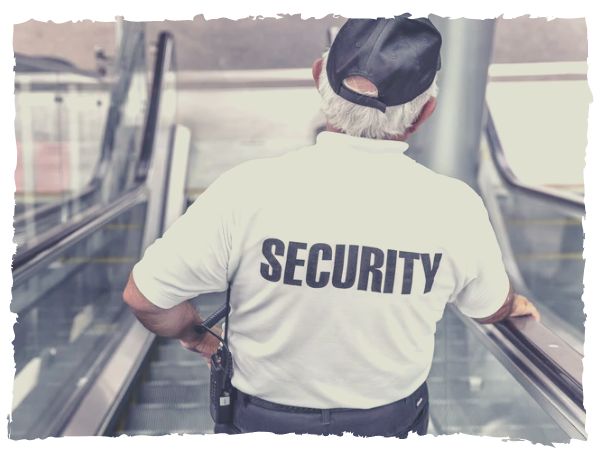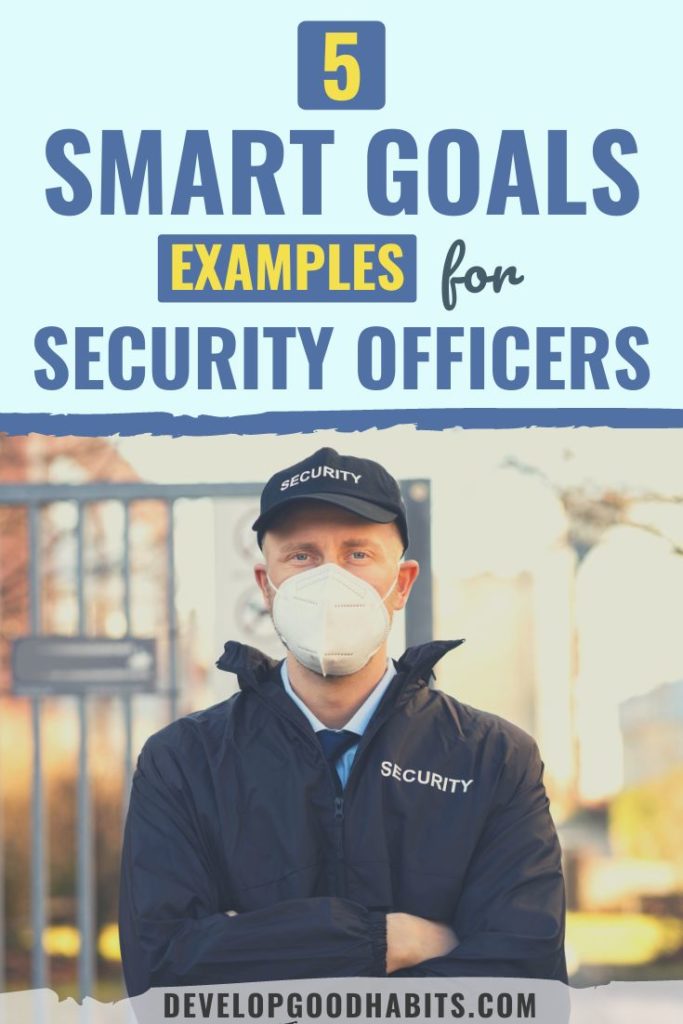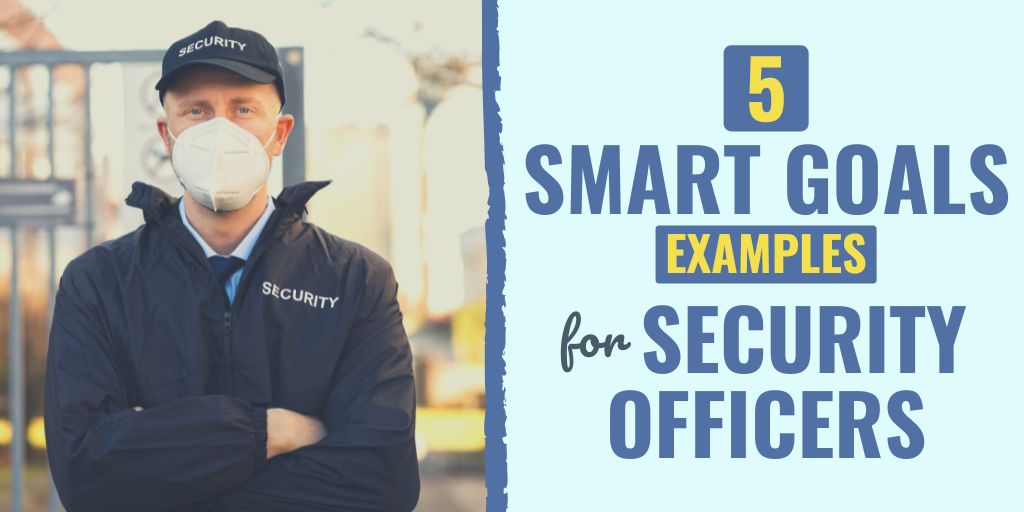Security officers or security guards are often the first lines of defense for domestic or commercial properties. However, protecting property from break-ins and thefts is not an easy job, and it comes with significant challenges.
Challenges security officers face include dealing with potential criminals, physical safety, dehydration, heat-related issues during the summer, rashes and skin problems, etc. In addition, finding a good security officer position in the first place can be an issue.
SMART is a specific goal-setting methodology that can help you easily overcome these obstacles. This article will look at 5 examples of SMART goals for security officers.
What Are SMART Goals?
Before we start looking at SMART goal examples for security officers, it would be helpful to know what they are.
SMART goals aren’t just regular goal statements. Instead, they incorporate five specific aspects that work toward achieving a greater goal.
The SMART acronym stands for Specific, Measurable, Attainable, Relevant, and Time-Bound. So, what do each of these letters stand for?
If you would like a more in-depth explanation of SMART goals, take a look at this Ultimate Guide to SMART goals.
Why Are SMART Goals Important for Security Officers?
Before talking about SMART goals for security officers, we need to determine what challenges security officers face in their jobs. Remember, SMART goals are designed to overcome specific challenges.
One of the biggest challenges you will face as a security officer is people. Dealing with difficult people, and even criminals, trespassers, and thieves is the most significant part of the job and the biggest challenge. Therefore, conflict resolution is an essential skill.
When conflicts cannot be resolved with words, a situation can get physical. Therefore, another challenge security officers face is physical safety and the ability to defend themselves if needed.
There are t other challenges, such as being able to patrol a specific area effectively in the allotted time frame. Physical fitness is another issue because security officers must be in decent shape to properly perform their jobs.
Having to coordinate with other security officers is another of the many challenges of this career.

Yet another challenge, particularly in the summer, involves challenges created by the weather. Summer heat can be pretty dangerous and lead to dehydration, skin issues, and more.
However, with SMART goals, you can work to overcome and even eliminate these challenges. Setting a SMART goal will clearly define your objective and the means to achieve that end. In addition, a SMART goal will enable you to measure and monitor your progress over a set period.
A SMART goal is a clearly defined plan of action to solve a particular issue, whatever it may be. With the right kinds of SMART goals, overcoming obstacles security officers face is easier. So let’s move on and see what SMART goals for security officers might look like.
5 Examples of SMART Goals for Security Officers
We’ll look at 5 SMART goal examples directly related to challenges faced by security officers.
1. Complete a Physical Self-Defense Course
“My goal is to take a physical self-defense course to better defend myself on the job when needed. I will start this self-defense course by the end of this week and complete it within the allotted time. I will aim to pass all tests with perfect scores and attain regular feedback from instructors to ensure that I am mastering the necessary skills. The end goal is to never let a trespasser or thief cause bodily harm to me or those around me.”
S: This goal is specific – to master and perfect all skills laid out by the self-defense course within the allotted time.
M: This goal is measurable because the instructors will provide feedback on your performance, as will the tests. It is also measurable regarding the time it takes to learn these skills and complete the course.
A: This goal is easy to achieve and realistic. Taking a self-defense course a few times per week should not be challenging.
R: This goal is relevant, as security officers regularly face physical threats and harm.
T: This goal is time-bound because the aim is to immediately prevent physical harm and complete the self-defense course in the allotted amount of time.
2. Prevent Dehydration
“My goal is to drink at least one cup of water per hour over my eight-hour shift or 2 liters throughout the day. I will set hourly reminders on my phone and keep track using an application on my smartphone. My end goal is to prevent dehydration on a hot day.”
S: This goal is specific – to drink one cup of water per hour or eight cups per shift, and keep track using an app and reminders.
M: This goal is easy to measure using water drinking reminders and apps to track water intake. When eight cups have been consumed, the goal has been achieved.
A: This goal is realistic and attainable, as drinking water is easy.
R: This goal is relevant, as security officers often don’t drink enough water on the job and end up dehydrated. Staying hydrated is a good habit to have.
T: This goal has a deadline – to drink one cup per hour and eight cups by the end of the shift.
3. Improve Cardiovascular Fitness
“My goal is to go to the gym three times per week, mainly for cardiovascular training. My goal is to increase the amount of time I can spend performing moderate to heavy cardiovascular exercise by at least 5% per week, increasing cardiovascular output by 100% by the end of the year.”
S: This goal is specific – to increase weekly cardio output by at least 5%, with a 100% increase by the end of the year.
M: This goal is easy to measure by paying attention to the stats displayed on the exercise equipment and by monitoring how long you can engage in exercise before tiring.
A: This goal is attainable and realistic, as a few trips to the gym per week should be doable. Cardiovascular output is shown to increase with regular training.
R: Good cardio is vital for effectively engaging in patrols and, if necessary, pursuing trespassers and criminals.
T: This goal is time-bound – to increase cardio output by a certain amount over a given period.
4. Complete a Conflict Resolution Course
“My goal is to take a conflict resolution course to better deal with difficult people. The first goal is to score at least 90% in the conflict resolution course. The main goal is to completely eliminate all physical conflicts within one month of completing the course.”
S: This goal is specific – to take a conflict resolution course to eliminate physical conflicts on the job.
M: This goal is measurable, first by the grade you get in the course and by monitoring the number of physical conflicts.
A: This goal is attainable, as a good conflict resolution course should help prevent physical conflicts.
R: This goal is relevant, as physical confrontations are a regular part of this job.
T: This goal is time-bound – first by completing the course in the allotted time. It’s also time-bound because the goal is to eliminate physical conflicts within a certain period.
5. Ask for a Raise
“My goal is to achieve a minimum of a 15% pay increase within the next six months. I will do this by asking for a raise based on my performance. If I cannot secure a salary raise within the next six months, I will begin applying for better-paying positions. I will apply for at least one new position every week to secure a better-paying position within the next 12 months.”
S: This goal is specific: getting a 15% raise – either getting a raise at the original job or finding a better-paying position within 12 months.
M: This goal is measurable. If the 15% raise is granted, the goal has been achieved.
A: This goal is attainable, as performance-based raises are standard.
R: This goal is relevant, as your well-being depends on your compensation.
T: This goal is time-bound: to get a raise or a better-paying position within a set period.
Final Thoughts on SMART Goals for Security Officers
Setting SMART goals as a security officer will help you overcome obstacles you face in this line of work. These SMART goals offer you a clear-cut way to achieve a specific end in a measurable way. If you want to improve your performance as a security officer, setting SMART goals may be the best way to go about it.
And if you want more SMART goal ideas and examples, be sure to check out these blog posts:
- 5 SMART Goals Examples for Risk Management
- 6 SMART Goals Examples for Social Workers
- 5 SMART Goals Examples for Maintenance Workers
Finally, if you want to take your goal-setting efforts to the next level, check out this FREE printable worksheet and a step-by-step process that will help you set effective SMART goals.


